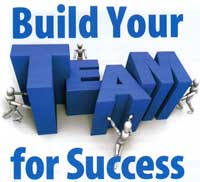Employment Articles

Build Your Team for Success
BY SIMON PAYN

It's a wonderful time for people with disabilities, says Stephen McDonnell.
Employers are competing to find the best talent, and people are understanding accommodations. But, says the senior adviser on talent management and diversity at BMO Financial Group, it's important everyone has support in place to help them make the journey from school to work.
You can bet Avril Lavigne has a success team — people who follow her around and make sure her hair is looking shiny and that the media is kept at bay.
She's not the only one. It's a fact that behind every success is a team of people.
And that's a useful concept for anyone looking for a job. Particularly so if you have a disability.
Stephen McDonnell advises every job-hunter to “captain their own team.”
He suggests at the start of your graduating year you put together a group of four or five people who will give you some honest feedback.
“The critical thing is not to invite people who are thereto tell you what you want to hear,” he says. “Get people who will speak to you honestly, give you real feedback and real information that will help you in your job search.
“Have someone on your team who is brave enough to say/when is the last time you laundered your clothes?” or, “when is the last time you cleaned your shoes or your wheelchair?”
The ideal team, says McDonnell, might be made up of a fellow grad, an entrepreneur, someone with human resources experience and maybe someone in a university careers centre.
You can talk to your team about your plans and ideas and get some honest feedback. They can help you role play interviews — perhaps grab some sample job ads to try out and then keep practicing on a weekly or monthly schedule.
And when you get a job interview, your team is there to make sure you have a copy of \your resume with you, to check the batteries are charged on any adaptive technology you are taking with you, and to ensure you have phoned in advance to make sure the venue is accessible.
Then after the interview you can use your team to debrief. Indeed, keep your team around after you start work by including someone in your office. If for example, you have a seizure disorder, your team can help make sure your dignity is maintained during a seizure.
"Find people who will commit to you for up to two years to help you find a job or maybe find out the reason you are not getting a job,” says McDonnell. “And find people who will commit to you for a year after you are employed so you can say, 'this is my first performance review, what do you think of it?'
Find an Employer That is Right for You
More companies than ever have created an inclusive workplace. But not all of them are there yet. So why choose an employer that's still operating in the Dark Ages? McDonnell suggests students use their research skills to find an organization that will be a right fit. As he says, “it’s nice to have a job; it's better to find a place where you can make a career.”
Read employers' websites and annual reports to find out who they give money to, where their scholarships are held and what they do for philanthropy. “The litmus test I use is whether they are giving to the disabled or do they have a scholarship program for people with disabilities,” says McDonnell.
Find out if they understand corporate social responsibility, part of which is having a representative workforce. BMO, for example, has a statement that says: we draw our strength from the diversity of our people and our business.
“I would seriously counsel someone who did not find those kinds of statements in a firm to ask if they really want to work there, because it doesn't sound like it has a supportive environment,” he says.
Call disability-specific organizations, such as the CNIB, to ask about their experience with a particular firm.
Making Volunteering Work for You
Volunteering is a great way to build real-life experience. But McDonnell says it's important to quantify how much volunteering you have done so you can demonstrate your activities to any employer.
“Most disabled people in some shape or form are an activist in the community or they are involved in campus doing something,” he says. “So write that down like it is work experience and also quantify it.
“Write down your volunteer activities in a journal. At graduation, you can say on your resume you have over 250 hours of work in the campus legal aid clinic, or you've done volunteer tasks for 300 hours. Employers understand what that's worth.”
McDonnell also says it's important to have a reference who can talk about this volunteer work if any employer calls. “We've made hires based on that,” he says.
“Stay in touch with people who can speak to who you are from a values perspective and also from a work experience perspective.
“Keep that network alive. If you're shy or an introvert, really work on that part of yourself. Force yourself to be a bit more extroverted to keep track of information about your network and put a holiday card in the mail.”
Advice for the Interview
It's important to talk about what you can do, rather than what you can't do, at interview, says McDonnell.
“The interview must always be about your ability, your skills, your competencies and your gifts,” he says.
“If an interviewer spends an hour talking about your disability, you are not going to be able to get a job there.”

 Quick Question:
Quick Question:

